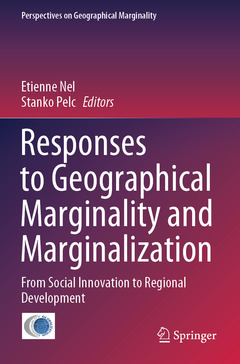Description
Responses to Geographical Marginality and Marginalization, 1st ed. 2020
From Social Innovation to Regional Development
Perspectives on Geographical Marginality Series, Vol. 5
Coordinators: Nel Etienne, Pelc Stanko
Language: English
Subjects for Responses to Geographical Marginality and Marginalization:
Keywords
Geographical marginality; Marginalisation; Regional development; Rural areas; Social innovation; Economically weak regions; Local revitalization; Agro-ecology transition; Social enterpreneurship; France; Canada; Switzerland; Poland; Australia; Sparcely populated rural areas; Finland; Desolate vollages; Polish-Czech borderland; Motorway construction
Publication date: 08-2021
183 p. · 15.5x23.5 cm · Paperback
Publication date: 08-2020
183 p. · 15.5x23.5 cm · Hardback
Description
/li>Contents
/li>Biography
/li>Comment
/li>
This book examines regional responses to marginality by highlighting social innovation, local capacity and new path formations in what are often seen as economically weak regions where policy and institutional considerations play a key role. Divided into three parts, it covers a wide range of topics related to geographical marginality from various angles, on both regional and local scales. The first part focuses on the role of social innovation and illustrates the themes of social innovation and new localism, local revitalization and social entrepreneurship. The second part then addresses the issues of economic responses, valorization, resource use and local action in response to marginalization. Lastly, the third part explores various policies and measures taken to respond to marginality and intensify regional development in marginal areas.
Introduction.- PART 1: SOCIAL INNOVATION AS A TOOL FOR DEMARGINALIZATION, Pierre-Antoine Landel and Sabine Girard: Questioning the Transformative Capacity of Social Innovation: The Example of Agroecology Transition in the Drôme Valley (FR).- Juan-Luis Klein: Social Innovation, Knowledge and Local Revitalization: a case of knowledge co-construction in a local rural community.- Mélanie Doyon, Juan-Luis Klein , Pierre-André Tremblay and Camille Arsenault-Hétu: Local Community and Social Enterprise: a food security oriented initiative in Saint-Camille.- PART 2: REGIONS, REGIONAL POTENTIALS, REGIONAL DEVELOPMENT AND GEOGRAPHICAL MARGINALITY, Walter Leimgruber: Rich country – 'poor' regions: fighting regional disparities in Switzerland.- Tomasz Komornicki and Konrad Czapiewski: Economic Lagging and Regional Development – some narrative stories from Podkarpackie, Poland.- Jerzy Banski: The evaluation of local resources from the point of view of their role as factors underpinning development in the marginal regions of eastern Poland 16.- Walter Leimgruber: Nature Parks: valorising regional potential. The example of the Gruyère Pays-d'Enhaut regional nature park.- Etienne Nel & Teresa Stevenson: Responding to Marginalization in Australia through regional and local action, with a specific focus on Western Australia.- PART 3: POLICIES, ACTIONS AND OTHER RESPONSES TO MARGINALITY, Toivo Muilu: Policies of sparsely populated rural areas in Finland.- Krystian Heffner, Agniesza Latocha: Desolated villages as example of spatial, economic and social marginalization in the Polish-Czech borderland.- Hugo Capella: Ibiza: A disrupting merge.- Raularian Rusu, Titus Man and Sandu Ciprian Moldovan: The impact of motorway building on the accessibility to marginal areas in the West Region of Romania.
Etienne Nel is a Professor at the Geography Department of the University of Otago in New Zealand. His research interests include regional and local economic development, and small town and community development in Africa and Australasia. He chaired the IGU Commission on Marginalization, Globalization, and Regional and Local Responses from 2004 to 2012. He was the Managing Editor of the New Zealand Geographer (2012–18) and is currently the Commissioning Editor for the Journal of Geography in Higher Education & for Local Economy. He has co-authored or co-edited 11 books, 6 conference proceedings, 48 book chapters and 112 articles.
Stanko Pelc is a Professor of Geography at the University of Primorska in Koper, Slovenia. He studied at the Faculty of Arts, and at the Faculty of Architecture, Construction and Geodesy (M.Sc.) at the University of Ljubljana and the Faculty of Science at the University of Zagreb (Ph.D.). He has been involved in rural development and the planningof transportation systems, and he has taught at the University of Ljubljana and University of Maribor. He currently teaches at the Departments of Pre-school and Primary Education as well as at the Geography Department at the University of Primorska in Koper. His research interests cover many different fields, such as demography, transportation geography, local and regional development, marginality and marginalization, especially its social dimension and educational context. He is (co)author of 24 scientific articles, 22 published scientific conference contributions and 29 parts or chapters in monographs. He has edited four books and is the author of two books and one university textbook (in Slovenian).




